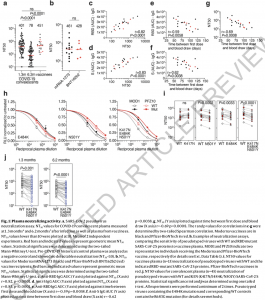Recent findings from COVID-19 vaccine trials conducted in South Africa have demonstrated lower effectiveness of COVID-19 vaccines against the B.1.351/501Y.V2 SARS-CoV-2 variant. In this article, we provide a summary of a recent study that investigated COVID-19 mRNA vaccine-induced antibody (Ab) and memory B cell responses against SARS-CoV-2 variants (Wang et al., 2021). Researchers analysed samples from 20 volunteers who received either the Moderna (mRNA-1273; n=14) or Pfizer-BioNTech (BNT162b2; n=6), 3-14 weeks post-second vaccination.
They demonstrated that the neutralisation potency of human immunodeficiency virus-1 (HIV-1) pseudotyped with SARS-CoV-2 S proteins were similar between convalescent and vaccine-induced Abs. Unfortunately, neutralisation by vaccine-induced Abs against pseudovirus that contained mutations (K417N, E484K and N501Y) present in SARS-CoV-2 variants* was significantly reduced, a finding also demonstrated by others. (Read previous articles: Mutations in SARS-Cov-2 B.1.351 variant reduces vaccine induced Ab neutralisation). Interestingly, fold reduction of the neutralisation potency by vaccine induced-Abs (1-3 fold reduction) was not as high as reduction observed by Abs induced by natural infection (0.5-29 fold reduction). This suggests that vaccine-induced Ab immunity may offer better protection against SARS-CoV-2 variants than naturally induced immunity. Further, researchers showed that B cell clonality induced by infection and vaccines were similar. However, vaccination induced higher proportions of B cell memory cells than infection. Lastly, using an in vitro assay Wang et al., demonstrated that Abs elicited by vaccines can impose selection pressure which could drive the emergence of K417N/E/T, E484K and N501Y/T/H mutations. Mutations also present in SARS-CoV-2 variants that can cause reinfection in convalescent individuals.
Researchers concluded that “[Their] experiments indicate that the RBD mutations found in [B.1.1.7/501Y.V1, B.1.351/501Y.V2 and P.1] variants, and potentially others that carry K417N/T, E484K and N501Y mutations, can reduce the neutralisation potency of vaccinee and convalescent plasma against SARS-CoV-2 pseudo- typed viruses… Thus, it is possible that these mutations and others that emerge in individuals with suboptimal or waning immunity will erode the effectiveness of natural and vaccine-induced immunity.”
*SARS-CoV-2 variants with mutations K417N, E484K and N501Y have been associated with increased infectivity, and may potentially escape pre-existing SARS-CoV-2 immunity resulting in SARS-CoV-2 reinfection.
Journal Article: Wang et al., 2021. mRNA vaccine-elicited antibodies to SARS-CoV-2 and circulating variants. Nature
Summary by Cheleka AM Mpande











